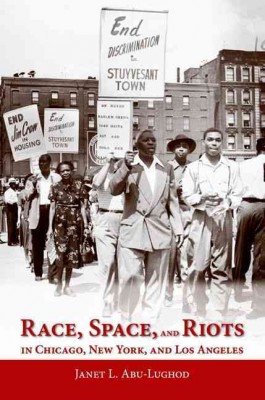| Race, Space, and Riots in Chicago, New York, and Los Angeles Contributor(s): Abu-Lughod, Janet L. (Author) |
|
 |
ISBN: 0199936552 ISBN-13: 9780199936557 Publisher: Oxford University Press, USA OUR PRICE: $43.69 Product Type: Paperback - Other Formats Published: July 2012 |
| Additional Information |
| BISAC Categories: - Biography & Autobiography | Cultural, Ethnic & Regional - General - Social Science | Sociology - Urban - Social Science | Ethnic Studies - African American Studies |
| Dewey: 305.896 |
| LCCN: 2012455060 |
| Physical Information: 0.9" H x 6.1" W x 9.1" (1.20 lbs) 360 pages |
| Descriptions, Reviews, Etc. |
| Publisher Description: American society has been long plagued by cycles of racial violence, most dramatically in the 1960s when hundreds of ghetto uprisings erupted across American cities. Though the larger, underlying causes of contentious race relations have remained the same, the lethality, intensity, and outcomes of these urban rebellions have varied widely. What accounts for these differences? And what lessons can be learned that might reduce the destructive effects of riots and move race relations forward? This impressive, meticulously detailed study is the first attempt to compare six major race riots that occurred in the three largest American urban areas during the course of the twentieth century: in Chicago in 1919 and 1968; in New York in 1935/1943 and 1964; and in Los Angeles in 1965 and 1992. Race, Space, and Riots in Chicago, New York, and Los Angeles weaves together detailed narratives of each riot, placing them in their changing historical contexts and showing how urban space, political regimes, and economic conditions--not simply an abstract race conflict--have structured the nature and extent of urban rebellions. Building on her previous groundbreaking comparative history of these three cities, Janet Abu-Lughod draws upon archival research, primary sources, case studies, and personal observations to reconstruct events--especially for the 1964 Harlem-Bedford Stuyvesant uprising and Chicago's 1968 riots where no documented studies are available. By focusing on the similarities and differences in each city, identifying the unique and persisting issues, and evaluating the ways political leaders, law enforcement, and the local political culture have either defused or exacerbated urban violence, this book points the way toward alleviating long-standing ethnic and racial tensions. A masterful analysis from a renowned urbanist, Race, Space, and Riots in Chicago, New York, and Los Angeles offers a deeper understanding of past--and future--urban race relations while emphasizing that until persistent racial and economic inequalities are meaningfully resolved, the tensions leading to racial violence will continue to exist in America's cities and betray our professed democratic values. Well researched, clearly written, and even more comprehensive than it claims...offers readers a concise study of twentieth-century urban racial violence in the three selected cities and serves as a good starting point for those interested in researching urban racial violence in more depth.--African American Review [Abu-Lughod] brings to this new book on riots an enormous amount of knowledge about the economic context of [New York, Chicago, and Los Angeles]...[this book] provide[s] good fodder for debate...[and] contains some provocative commentary and thoughtful discussion of riots, American style.--Political Science Quarterly Seeks to shed light on the ever changing nature of race relations in American cities and in America at large... The individual chapters on politics, race relations and civil unrest in Chicago, New York, and Los Angeles are masterful, describing the long-term transformations of the each city's spatial, racial, and political character and locating each riot event within those transformative moments... ultimately a rewarding read.--Urban Affairs In this new book, she [Abu-Lughod] neatly balances the historical facts of each of these cities with a deeply informed interpretation that clearly advances our knowledge of how both large and small riots unfold... rich with evidence and insight... As an urbanist, the author is without parallel when she dissects the U.S. federal effort to address the housing needs of the population.--Anthropological Quarterly Abu-Lughod should be commended for her scholarly contribution and for drawing attention to these pivotal events as important signs or indicators of tectonic shifts (pp. 255, 260) taking place in the racial and political landscape of American cities...As Abu-Lughod convincingly argues, the future of urban areas, and the likelihood of future riots, will indeed depend on how American society chooses to deal with the enduring issues of racial and spatial inequality.--City & Community Interesting and provocative... Abu-Lughod provides a detailed and compelling analysis of the grim consequences of racism in US society. Well-written and accessible, this book is a must buy for all university libraries. Summing Up: Essential.--Choice Professor Abu-Lughod's well-documented study offers an unbiased historical account of six major American race riots. But this book is so much more... Race, Space, and Riots is not only superb scholarship, it is valuable wisdom on pragmatic strategies to prevent and cope with urban racial unrest.--The Journal of Blacks in Higher Education Janet Abu-Lughod, a luminary in the field of urban sociology, has published a compelling comparative analysis of twentieth-century race riots in the nations' three largest cities... adroitly synthesizes enormous amounts of historical data from the three cities in question, and her comparative method is illuminating.--H-Net Reviews With the drama of a storyteller and the rigor of a social scientist, Janet Abu-Lughod bares the institutional underbelly of ethnic conflict in America's three largest cities. She shows how long-standing patterns of repressive policing and unresponsive politicians can drive African Americans to riot--and how efforts at 'containment' have moved to prisons from the streets. This is not just a comparative history of urban conflict, but a call for new national priorities. It should be required reading for all students, teachers, and elected officials.--Sharon Zukin, author of The Cultures of Cities Marshalling her unparalleled knowledge of the ecology, economy, culture and politics of New York, Los Angeles, and Chicago, Janet Abu-Lughod has produced the first in-depth compa |